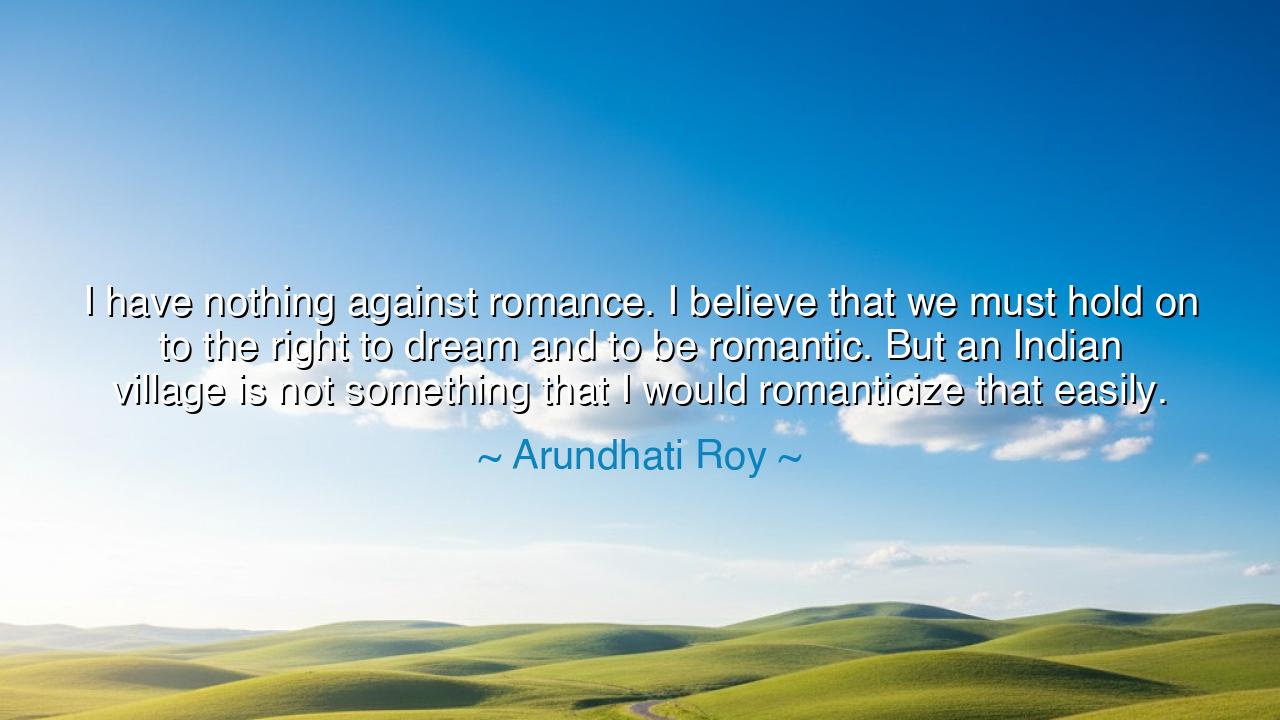
I have nothing against romance. I believe that we must hold on to
I have nothing against romance. I believe that we must hold on to the right to dream and to be romantic. But an Indian village is not something that I would romanticize that easily.






The words of Arundhati Roy—“I have nothing against romance. I believe that we must hold on to the right to dream and to be romantic. But an Indian village is not something that I would romanticize that easily.”—resound with both tenderness and sharp truth. She does not dismiss romance nor the power of dreams, for these are sacred gifts of the human spirit. But she warns against a dangerous illusion: the romanticizing of suffering, the painting of hardship in the colors of fantasy. To dream is noble, but to mask reality with false beauty is to betray truth.
When Roy says we must hold to the right to dream, she acknowledges that without hope and imagination, humanity withers. To be romantic is to see possibility, to hold a vision of tenderness and beauty even in a fractured world. Yet she draws a boundary: not all things should be draped in the cloth of romantic idealism. For to romanticize an Indian village—where poverty, hunger, and exploitation may still press heavily upon the people—is to turn away from suffering and mistake it for charm. In such illusions, injustice is hidden, and compassion is replaced with sentimentality.
This wisdom is ancient. Recall the poets of the pastoral tradition, who painted villages and shepherds as havens of simplicity and purity. To the city-dweller, this was a fantasy of innocence. Yet beneath the pastoral song lay the lives of real peasants, who labored under the weight of toil, drought, and hunger. In Rome, Virgil’s Georgics celebrated the beauty of the land but also revealed the struggle of farming, reminding readers that life in the village was both noble and harsh. Roy stands in this same lineage of truth-tellers, exposing the danger of seeing only the romance while ignoring the hardship.
History also gives us the voice of Mahatma Gandhi, who spoke often of the Indian village as the heart of the nation. To him, it represented community, self-sufficiency, and simplicity. Yet Gandhi himself did not deny the suffering within those villages; he called for their upliftment, for sanitation, education, and dignity. Where Gandhi saw both beauty and burden, Roy reminds us that to glorify only the beauty is to risk leaving the burden untouched.
The meaning of Roy’s words is therefore twofold. On the one hand, she honors the power of dreams—for without romance, art and life become barren. On the other, she insists that romance must not blind us to reality. A dream that ignores truth is not a vision but a delusion. To truly honor the village, or any community, is not to clothe it in false idealism, but to see it as it is, and to work to heal its wounds. Only then can romance and truth walk hand in hand.
The lesson for us is to guard against the temptation to romanticize suffering. Do not call hardship beautiful simply because it stirs your imagination. Instead, let the awareness of pain lead to compassion, and let compassion lead to action. To romanticize is easy; to act with justice and empathy is harder, yet infinitely more noble.
Practically, this means cultivating honest vision. When you see poverty, do not call it purity—see the need and respond with help. When you see struggle, do not label it quaint—see the injustice and work to change it. At the same time, keep alive the right to dream, for it is only through imagination that change becomes possible. The task is to balance both: to dream, but also to act; to romanticize love and hope, but not the chains of suffering.
Thus, Arundhati Roy’s words shine as both warning and inspiration. Romance is sacred, but it must never become a veil for truth. Let us hold fast to our dreams, but let our dreams be wedded to reality, so that we may not only imagine a better world but also labor to bring it forth. In this balance lies both wisdom and the path to justice.






AAdministratorAdministrator
Welcome, honored guests. Please leave a comment, we will respond soon